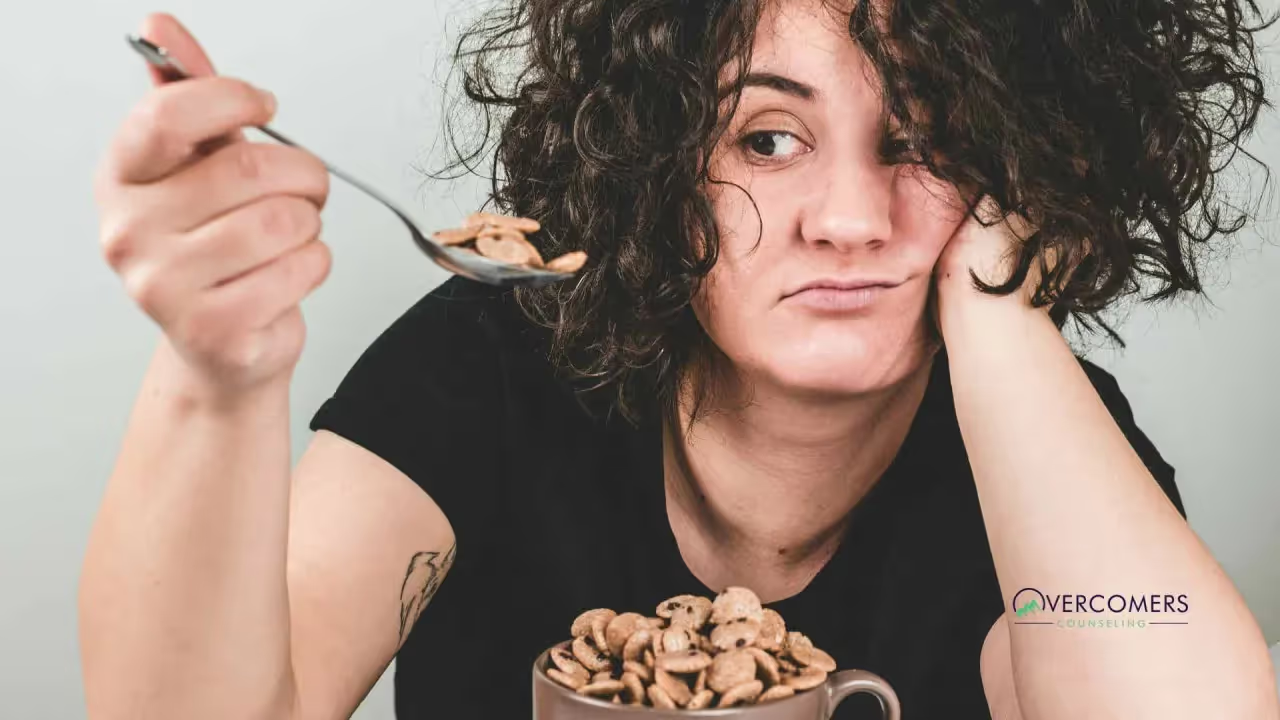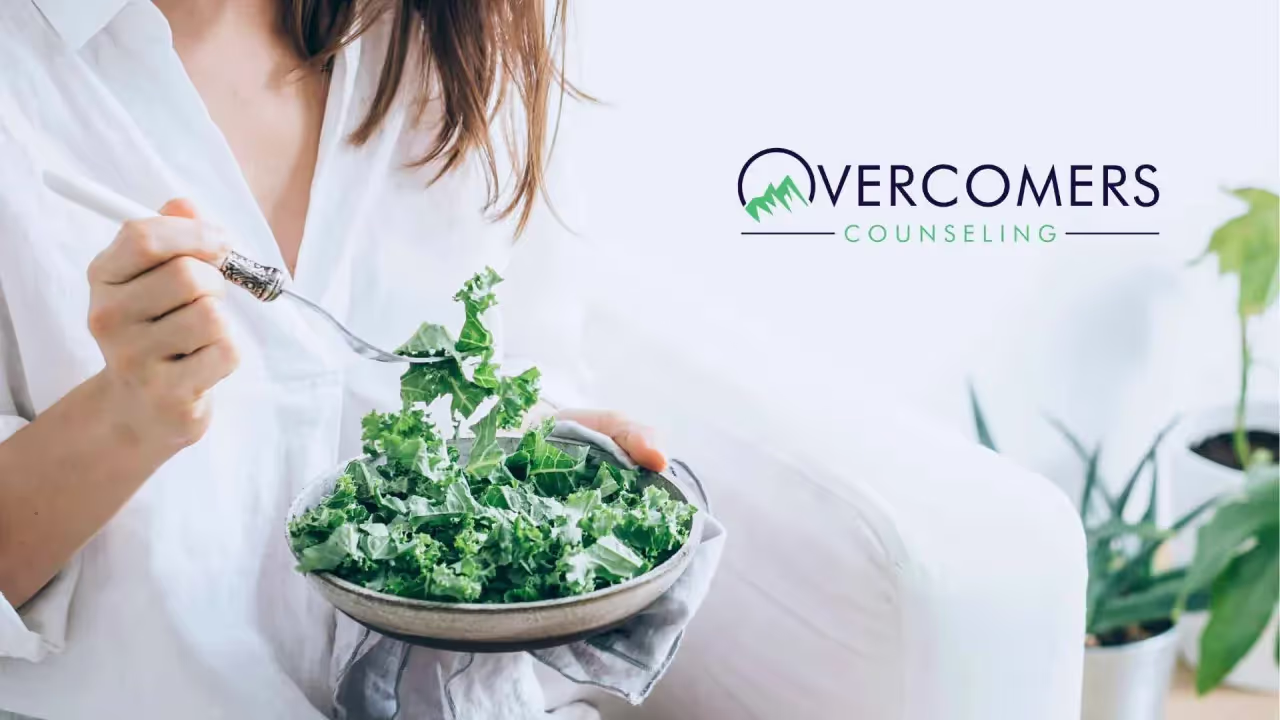IntroductionHave you ever thought about how much of an impact treating eating disorders can have on someone's life?These disorders are a tangled mix of...

Have you ever thought about how much of an impact treating eating disorders can have on someone's life?
These disorders are a tangled mix of psychological, physical, and social issues that often go unnoticed.
Addressing these concerns goes beyond just changing how one eats; it's a process of restoring health to both the mind and body.
Comprehensive care and support are vital in this healing process.
Eating disorder support groups are incredibly important, providing a safe and private place for people to share their experiences, struggles, and successes with others who understand what they're going through.
Overcomers Counseling is a premier destination for top-tier therapy and counseling services in Colorado.
We acknowledge the complexities involved in battling eating disorders and are committed to guiding you toward a path of healing and recovery.
We offer support every step of the way, equipped with the expertise to assist individuals facing challenges with anorexia nervosa, bulimia nervosa, binge eating disorder, and other related conditions.
At Overcomers Counseling, we adopt a comprehensive approach to treatment, focusing on more than just the physical manifestations of eating disorders.
We aim to address the emotional and mental factors that play a significant role in disordered eating patterns.
By tackling these root causes, we strive to help our clients achieve a balanced and healthy lifestyle, empowering them to regain control over their eating behaviors and ultimately, their lives.
Visit: Overcomers Counseling Eating Disorder
Call: (719) 345-2424
La Luna Center in Boulder, CO, is dedicated to aiding women in their recovery from eating disorders, offering a blend of individual therapy sessions for personalized care and group sessions for communal support.
This holistic approach not only addresses the immediate challenges of eating disorders but also fosters an environment of understanding and empathy, crucial for the healing process.
With a free consultation, La Luna Center invites individuals to discover the range of services they provide, from therapy that delves into the psychological aspects of eating disorders to group sessions aimed at social and behavioral recovery.
Acknowledging the intricate nature of eating disorders and their significant impact on a woman's life, the center adopts a comprehensive strategy that targets both the symptoms and their underlying causes.
Website: La Luna Center
Counseling and Psychiatric Services (CAPS) at the University of Colorado provides a supportive environment for students grappling with mental health issues, including eating disorders.
Through a variety of services such as individual counseling, group therapy, and workshops, CAPS aims to assist students in managing their symptoms and enhancing their mental health.
The team of counselors at CAPS is equipped with evidence-based treatments and support strategies designed to meet the unique needs of each student.
For those who seeking assistance, CAPS can be reached at (303) 492-2277.
Website: https://www.colorado.edu/counseling/
Overeaters Anonymous provides a supportive community for individuals grappling with compulsive eating through their virtual meetings.
These gatherings offer a platform for people to share their experiences, challenges, and successes in a non-judgmental space.
While the focus is not solely on eating disorders, the inclusive environment welcomes anyone dealing with related issues.
Individuals from Boulder and beyond can access these virtual meetings, allowing them to connect with others facing similar struggles from the comfort of their own homes.
The virtual meetings hosted by Overeaters Anonymous serve as an essential resource for those seeking help with compulsive eating behaviors.
Check their website for virtual meetings that Boulder residents can join.Overeaters Anonymous Virtual Meetings

Recovery Record - This app is designed for those recovering from an eating disorder, including anorexia nervosa, bulimia nervosa, and binge eating disorder.
It allows users to keep a log of their meals, feelings, and coping strategies.
It also includes features like meal planning, motivational rewards, and the ability to connect with a treatment team.
Rise Up + Recover - An app that lets you log your meals, emotions, and behaviors, providing insights into patterns that may trigger disordered eating.
It's designed to be used in conjunction with therapy and other forms of treatment. The app also offers resources and coping strategies.
Ate Food Journal - This visual food diary app encourages mindfulness in eating habits.
It's not specifically designed for eating disorders but promotes a healthy relationship with food by focusing on why you eat rather than calorie counting.
Users can also share their diaries with their support network or healthcare provider.
Nourishly - Geared towards individuals with eating disorders as well as those with gastrointestinal disorders, Nourishly provides a comprehensive platform for meal logging, symptom tracking, and accessing a support team.
MindShift CBT - While not exclusively for eating disorders, MindShift CBT uses cognitive behavioral therapy techniques to help users deal with anxiety and stress, which are often comorbid with eating disorders.
It includes tools like thought journals, belief experiments, and comfort zone challenges.
Headspace - Known for its meditation and mindfulness resources, Headspace can be a beneficial tool for individuals looking to manage anxiety and stress, which can contribute to eating disorders.
Regular use can promote a more mindful approach to eating and body image.
Please note, that while these apps can provide valuable support, they should not replace professional treatment from qualified healthcare providers specializing in eating disorders.
Always consult with a healthcare professional to determine the best treatment plan for you.
Addressing an eating disorder promptly and seeking the appropriate support network can significantly impact one's journey to recovery.
Individuals need to connect with resources that resonate with their experiences and provide the empathy, strategies, and community needed to face this challenge.
Prioritizing your health and embracing the right support system, whether it involves therapy, support groups, or a mix of services, establishes a foundation for healing and allows you to reclaim control over your life.
The best way to help an addict without enabling them is by setting boundaries and getting help for yourself. It is important to remember that you cannot control the addict's behavior, but you can offer support and understanding. With time and patience, you can help your loved one recover from addiction.
Treatment for alcohol abuse often includes counseling, support groups, and medication. With the right help, your spouse can recover from alcoholism and go on to lead a healthy and happy life.
Some resources for family members of addicts include therapy, counseling, 12-step programs, and other support groups. It is important to seek out these resources to get the tools you need to deal with your loved one's addiction. You can also find help for yourself through these resources.
Alcoholism refers to a disease that is characterized by a strong craving for alcohol and an inability to control one's drinking.
Alcohol abuse is a pattern of drinking that leads to problems in one's personal, professional, or social life.
Yes, alcohol abuse is a treatable condition. However, it often requires professional treatment to overcome. With the right support, though, anyone can overcome alcohol abuse and regain control of their life. It's important to reach out for help if you or someone you know is struggling. With the right treatment, anyone can overcome alcohol abuse and regain control of their life.